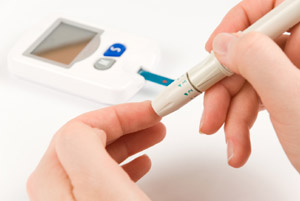Diabetes and the NHS
National spotlight for York research into cost of diabetes treatment
Research by the York Health Economic Consortium (YHEC) has projected that the NHS’s annual spending on diabetes in the UK will increase from £9.8 billion to £16.9 billion over the next 25 years - a rise that means the NHS would be spending 17 per cent of its entire budget on the condition.
 BBC Radio 4’s Today programme highlighted the Impact Diabetes report which also suggests that the cost of treating diabetes complications (including kidney failure, nerve damage, stroke, blindness and amputation) is expected to almost double from the current total of £7.7 billion to £13.5 billion by 2035/6.
BBC Radio 4’s Today programme highlighted the Impact Diabetes report which also suggests that the cost of treating diabetes complications (including kidney failure, nerve damage, stroke, blindness and amputation) is expected to almost double from the current total of £7.7 billion to £13.5 billion by 2035/6.
Developed in partnership with Diabetes UK, JDRF and Sanofi Diabetes, the report was published in the journal Diabetic Medicine. It highlighted the high percentage (79 per cent) of NHS diabetes spending that goes on complications – many of which are preventable – and speculates that investing in the checks and services that help people manage the condition and therefore reduce risk of complications could actually be less expensive than the current approach.
The report quantifies the current costs of direct patient care for diabetes (which includes treatment, intervention and complications) and indirect costs of diabetes, such as those related to increased death and illness, work loss and the need for informal care, and also predicts the UK’s future costs of diabetes. According to the report, the total cost associated with diabetes in the UK currently stands at £23.7 billion and is predicted to rise to £39.8 billion by 2035/6.
Diabetes is a prominent disease in the UK which has a significant societal and economic burden. Key findings from the report include:
- There are currently around 3.8 million people living with diabetes in the UK and, by 2035/6, this is expected to increase to 6.25 million
The current situation
- The current cost of direct patient care (which includes treatment, intervention and complications) for those living with diabetes is estimated at £9.8 billion
- £1 billion for Type 1 diabetes and £8.8 billion for Type 2 diabetes
- The current indirect costs associated with diabetes, such as those related to increased death and illness, work loss and the need for informal care, are estimated at £13.9 billion
- £0.9 billion for Type 1 diabetes and £13 billion for Type 2 diabetes
- Deaths from diabetes in 2010/11 resulted in over 325,000 lost working years
In addition to the above costs, it is estimated that there are 850,000 people in the UK who have diabetes but have not been diagnosed and, according to the study authors, the cost of undiagnosed diabetes can be estimated at an additional £1.5 billion.
The situation by 2035/6
- By 2035/6, the cost of direct care for patients will rise to £16.9 billion
- £1.8 billion for Type 1 diabetes and £15.1 billion for Type 2 diabetes
- By 2035/6, indirect costs associated with diabetes will increase to approximately £22.9 billion
- £2.4 billion for Type 1 diabetes and £20.5 billion for Type 2 diabetes
According to the organisations that commissioned the report the findings highlight the urgent need to invest in delivering already agreed national care standards for people with both Type 1 and Type 2 diabetes and for more investment in the scientific research that can help improve understanding of the condition.
Further information
